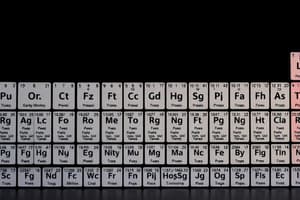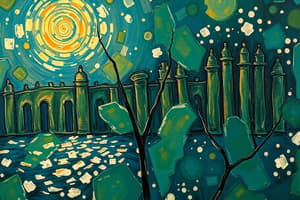Podcast
Questions and Answers
What is the characteristic of metals in terms of heat and electricity?
What is the characteristic of metals in terms of heat and electricity?
- Poor conductors
- Good conductors (correct)
- Moderate conductors
- Insulators
What type of ions do non-metal atoms form?
What type of ions do non-metal atoms form?
- Neutral ions
- Anions (correct)
- Cations
- Isoelectric ions
What is the term for elements that exist as two atoms bonded together?
What is the term for elements that exist as two atoms bonded together?
- Monatomic
- Triatomic
- Polyatomic
- Diatomic (correct)
What is the number of protons and neutrons that remains unchanged for atoms and their ions?
What is the number of protons and neutrons that remains unchanged for atoms and their ions?
What is the name of the ion formed when ₁₁Na loses 1 electron?
What is the name of the ion formed when ₁₁Na loses 1 electron?
What is the characteristic of non-metals in terms of their physical appearance?
What is the characteristic of non-metals in terms of their physical appearance?
What is the term for the positively charged ions formed by metal atoms?
What is the term for the positively charged ions formed by metal atoms?
What group of elements does not form ions?
What group of elements does not form ions?
What is the characteristic of a pure substance that cannot be broken down into simpler substances?
What is the characteristic of a pure substance that cannot be broken down into simpler substances?
What is the smallest particle in a compound?
What is the smallest particle in a compound?
What is the process by which the components of a mixture can be separated?
What is the process by which the components of a mixture can be separated?
What is the difference between the chemical properties of a mixture and a compound?
What is the difference between the chemical properties of a mixture and a compound?
What happens when a compound is formed?
What happens when a compound is formed?
What is the characteristic of the composition of a mixture?
What is the characteristic of the composition of a mixture?
What is a molecular element?
What is a molecular element?
What is the characteristic of a compound?
What is the characteristic of a compound?
Flashcards are hidden until you start studying
Study Notes
Elements
- An element is a pure substance that cannot be broken down into two or more simpler substances by any means.
- An element consists of one type of atom.
- Most elements are monatomic, but some are diatomic (ending with 'gen' or 'ine', e.g., hydrogen, nitrogen, oxygen).
Metals and Non-Metals
- Metals are good conductors of electricity and heat, lustrous, sonorous, malleable, and ductile.
- Metals have very high melting and boiling points and are usually solid at room temperature (except mercury).
- Metals form +ions by releasing their outermost electrons.
- Non-metals are insulators (except graphite), dull, and brittle, with low melting and boiling points (except graphite, diamond, and silica).
- Non-metals form -ions by gaining electrons.
Groups and Periods
- Columns in the periodic table are called groups, determined by the number of outermost electrons.
- Rows in the periodic table are called periods, determined by the number of shells in the atom.
Ions
- The number of protons and neutrons remains unchanged for atoms and their ions.
- Cations are formed when metal atoms lose all their outermost electrons, and anions are formed when non-metal atoms gain electrons to have full shells.
- Examples of cations: Na⁺ (sodium ion), Mg²⁺ (magnesium ion), Al³⁺ (aluminium ion).
- Examples of anions: P³⁻ (phosphide ion), S²⁻ (sulfide ion), Cl⁻ (chloride ion).
- The names of ions end with '-ide'.
Ionic Bonding and Compounds
- Ionic bonding occurs between metal and non-metal atoms that form ions with opposite charges.
- A compound is a pure substance containing different types of atoms/elements that are chemically combined in a fixed ratio.
- The smallest particle in a compound is a molecule or an ion.
- A compound can be broken down into elements or simpler compounds by chemical processes (e.g., thermal decomposition or electrolysis).
Molecules
- Molecules are combinations of atoms held together by covalent bonding.
- There are two kinds of molecules: molecular elements (e.g., H₂, O₂) and molecular compounds (e.g., combinations of different types of atoms).
Studying That Suits You
Use AI to generate personalized quizzes and flashcards to suit your learning preferences.




